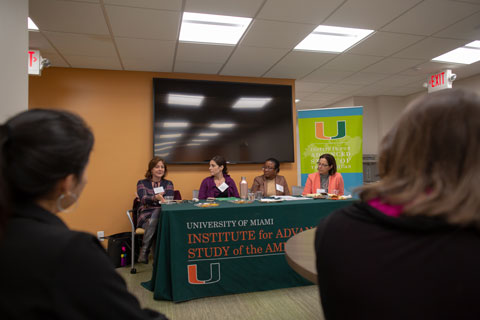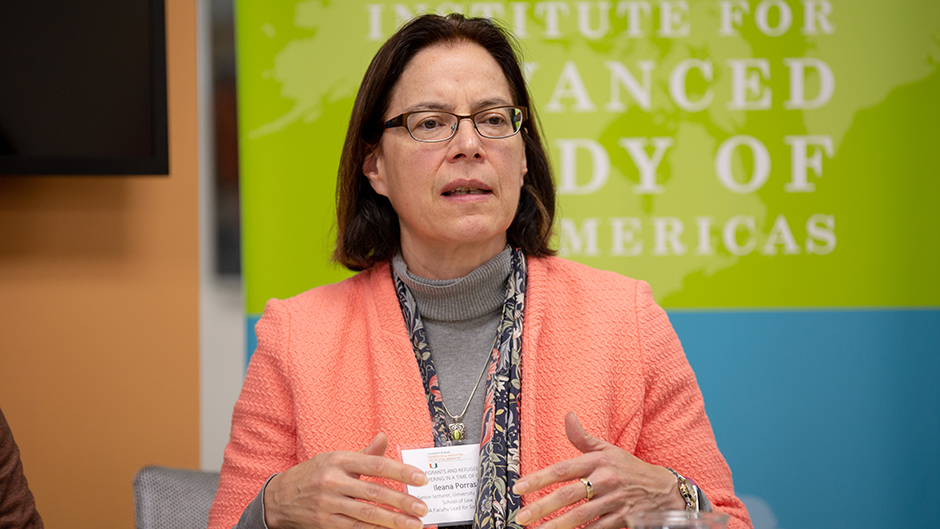At a time of spiraling crisis at the U.S. southern border and in legal proceedings across the country, representatives from three of the University of Miami School of Law’s most immigration-engaged legal clinics convened to explore how the current administration’s aggressive role to dictate policy is impacting their efforts and the clients they represent.
“Issues of social justice cuts across the work of 240 professors here at the University in their work on immigration and the diaspora, and, as actors and activists trying to restrain tinges of cruelty and ‘worthy-us-unworthy-them’ attitudes, it’s important to create a space where we can learn and interact,” said Sallie Hughes, associate professor in the School of Communication and faculty director for Latin American Studies at UM's Institute for Advanced Study of the Americas (U-MIA).
Hughes introduced the “Migrants and Refugees: Lawyering in a Time of Crisis” forum, sponsored and organized by U-MIA, held at the institute Thursday.
 Guided by moderator Ileana Porras, senior lecturer at Miami Law, speakers Romy Lerner, lecturer and associate director for the Immigration Clinic; JoNel Newman, professor and director of the Health Rights Clinic; and Kele Stewart, professor and co-director of the Children and Youth Law Clinic, explored the impact of the Trump administration’s stance to manage immigration through a strict national security lens.
Guided by moderator Ileana Porras, senior lecturer at Miami Law, speakers Romy Lerner, lecturer and associate director for the Immigration Clinic; JoNel Newman, professor and director of the Health Rights Clinic; and Kele Stewart, professor and co-director of the Children and Youth Law Clinic, explored the impact of the Trump administration’s stance to manage immigration through a strict national security lens.
Newman explained that the Constitution calls for Congress to set and administer immigration policy, but for a decade and longer attempts to do so have faltered and failed. “Yet part of the tension that we’re seeing in terms of immigration policy is because Congress hasn’t acted because it’s full of mines,” she said.
“No response and no action for so long from Congress has created a void—and the executive branch has entered, for good or bad, and that doesn’t really work very well,” Porras said. “Everybody should be yelling at your representative to do what they can to fix this broken system.”
The speakers particularly debated the pending end to Temporary Protected Status (TPS), a status granted by executive order. The Trump administration has vowed to terminate TPS for the three countries in question: El Salvador, Honduras, and Haiti.
Some 50,000 Haitians in the U.S.—most of them living in the Miami area—face deportation when the status expires in July 2019.
In 2011, Miami Law's Human Rights and Immigration clinics began an ongoing collaborative effort to halt deportations to Haiti in view of the ongoing effects of the January 2010 earthquake, the cholera epidemic, and political unrest. The project has involved international human rights advocacy before the Inter-American Commission on human rights, domestic policy advocacy, and individual case representation.
“Prior to the Trump administration there was a very generous interpretation of the policy based on the ‘we’re-not-fixed-yet’ situation in Haiti,” Newman explained. “These are extraordinary times and they are really scary times—there is a tremendous fear in the community.”
Through the law clinics and their efforts with community partners, Newman said it was important to “keep chipping away” through the individual cases and cited some favorable court rulings. “The question is what can we do for the hundreds of thousands of Haitians [holding TPS status and facing deportation in 2019], many of whom have lived here for decades, raised their children here, and contributed tax dollars?”
“U.S. immigration wasn’t a panacea before. A lot of this is not new—though it is more extreme and being done in a much more cruel and inhumane way,” said Stewart, who found some small solace in the fact that the crisis had prompted the law clinics to work together more collaboratively than ever.
“Particularly with the recent spike in unattended minor cases, there has been increased collaboration between the clinics,” she said. “The three clinics here today really went into lawyer mode—brainstorming, strategizing, working with our community partners, writing briefs together, providing trainings, engaging our students—every clinic doing something. This is such intense and important work.”
Moderator Porras suggested that the forum was the beginning of the conversation and that more steps and teaching moments were to come.
“Our intent is to provide the legal perspective on this very human story of immigration,” she said.

